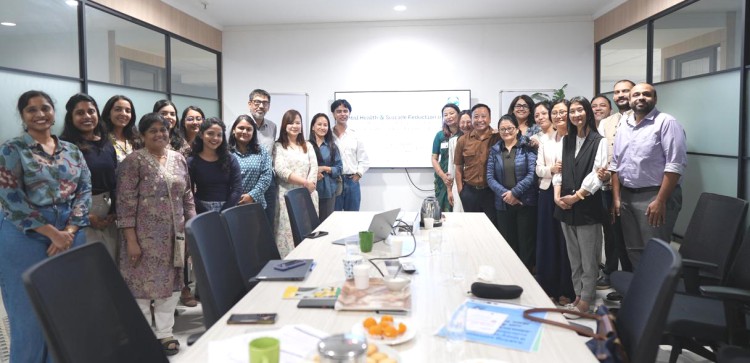




















Saturday, Dec 14, 2024 22:30 [IST]
Last Update: Friday, Dec 13, 2024 16:51 [IST]
GANTOK,: Stakeholders from the State government and civil society attended
a “Mental Health & Suicide Reduction in Sikkim
Consultation Workshop for Stakeholders” at Center for Mental Health Law &
Policy (CMHLP) at Pune and Ahmedabad between December 1 and 6. The workshop was
organized by Sikkim INSPIRES, State Health & Family Welfare department.
The
initiative from Sikkim INSPIRES utilizes a participatory process including
stakeholders from the health service delivery system, community stakeholders
and persons with lived experience during the planning and implementation phases,
informs a press release.
Participants
for the consultation workshop included a diverse group which aims to unite
community and civil society representatives to inform an inclusive, localized
strategy for the ultimate goal of improving mental health in Sikkim. The
participants were Kopibari panchayat member Swarnim Lama, Namchi DC Anupa
Tamling, School Health Programme SPO Dr. Karma Chaden Bhutia, Sikkim INSPIRES
nodal officer Dr. Sonam O. Lasopa, NBBGC assistant professor Dr. Nancy Choden
Lhasungpa, Sikkim INSPIRES PDD Roshnila Gurung, Modern senior secondary school
teacher Yankila Lama, BDS president (Martam block) Chumila Bhutia, and media
persons Nirmal Manger, Bhuwan Sharma and Yashu Sharma.
The
primary purpose of the consultation included working on the roadmap and
strategies for mental health and suicide reduction in the State. This activity
documented the processes and insights from the stakeholder consultations for
mental health and suicide prevention conducted earlier between September 9 and
12 at Gangtok in collaboration with the CMHLP, Pune.
The
session was led by CMHLP director Dr. Soumitra Pathare, program manager Amiti
Varma, assistant program manager Swetha Ranganathan.
The
CMHLP team presented a draft report based on the earlier consultations which
was discussed in length with engagement of all participants from Sikkim
providing perspectives and inputs from their respective fields. This was
followed by a session on planning and prioritizing the next steps towards a
strategy for mental health and suicide reduction in the State.
The
consultation workshop also focused on learning about evidence based mental
health and suicide prevention interventions being implemented in other states
in the nation.
The
sessions were received with enthusiasm and all stakeholders from the Sikkim
team were involved in active participation and insightful discussions owing to
the enriching information and implementation research presented by the CMHLP
team members.
Further,
the program also included field visits to four villages in Mehsana, Ahmedabad,
Gujrat to benefit from practical learnings about ongoing community mental
health (ATMIYATA) and community suicide prevention interventions (SPIRIT) that
are being implemented. The ATMIYATA program has been accorded as one of the 25
best mental health community programs in the world by the World Health
Organization.
During
the visits, attendees interacted with program implementers which included
community volunteers as well as the beneficiaries at the community to gain
insights about the processes as well as the challenges of community
interventions for mental health. Some of the interactions were held at the primary
sub health center/Ayushman Arogya Mandir to understand referral linkages from
the community to the institutional mental health service delivery system. The
team also visited the district hospital at Mehsana and interacted with the district
mental health program team led by chief district medical officer-cum-district
nodal officer.
Additionally,
officials from the Planning & Development department and Health department
travelled to the institutes of expertise in mental health in the country to
explore strategies to improve mental health with particular focus on suicide
reduction and de-addiction in Sikkim, the release adds.
From
December 6 to 7, the Sikkim INSPIRES team visited the Tata Institute of Social
Sciences (TISS) where the team discussed the mental health landscape and
challenges in Sikkim with the TISS authorities.
The
TISS team gave a presentation on various field projects on mental health which
included the School Initiatives for Mental Health Advocacy (SIMHA) to promote
the well-being of young people in educational systems. The program involves
advocacy for mental health, capacity building of service providers as well as
peer support and research.
An
overview of the Mumbai Education Research Innovation and Training (RISE)
Project was also presented which aims to support underprivileged children and
youth in education and employment. Following the presentations, discussions
were held on the development of modules and interventions for targeted at risk
groups for mental health issues which include children who need care and
protection as well as children in conflict with law. The possibility of
training community members for peer support and lay counseling was also
discussed.
The
Sikkim INSPIRES team also visited the National Institute of Mental Health and
Neuro-Sciences (NIMHANS), Banglaore which is the apex centre for mental health
and neuroscience in the country. The two-day visit on December 9 and 10 involved
meetings to “Address High Suicide Rates and Enhancing Mental Health” in Sikkim
chaired by the Director, NIMHANS Dr. Pratima Murthy.
The
NIMHANS director highlighted the importance of mental health initiatives and
assured the necessary technical support on the initiatives planned in Sikkim
though the Sikkim INSPIRES Program.
In
conclusion, the visits to CMHLP, TISS and NIMHANS aim to inform the mental
health initiative of Sikkim INSPIRES, H&FWD focusing on two strategic
actions: advancing mental health policies and scaling up quality interventions
and services for individuals in Sikkim. The overall strategy will employ a
systems strengthening approach that involves establishing community based
systems for mental health provision with a localization priority combined with
policies, structures and processes required to sustain these services, the
release mentions.
